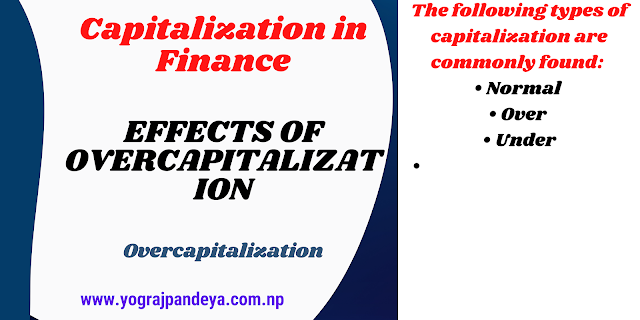Capitalization
in Finance
The book value, or the amount of a company's debt and equity, is referred to as capitalization in finance. The current market price multiplied by the total number of outstanding shares yields market capitalization, which is the monetary value of a company's outstanding shares.
What is Capitalization
Share capital, debentures, loans, free reserves, and other forms of capitalization are all included in capitalization. Capitalization refers to a company's long-term investment, excluding long-term borrowing. The terms capitalization and capital structure are not interchangeable. The phrase "capital structure" refers to the qualitative aspects of finance. While capitalization is a specific phrase that refers to the quantitative component, it is a broad term.
The following types of capitalization are commonly found:
• Normal
• Over
• Under
Overcapitalization
Overcapitalization occurs when a company's actual profits are insufficient to pay interest on debentures, loans, and dividends on its stock over some time. When a corporation raises more funds than it needs, this predicament occurs. A portion of capital is constantly idle. As a result, the rate of return is on the decline.
The following are some possible causes:
1. High promotional costs-
When a corporation spends a lot of money on advertising, such as making contracts, canvassing, underwriting commissions, and preparing documents, and the actual returns aren't enough to justify the high costs, the company is over-capitalized.
2. Purchasing assets at inflated pricing-
When a corporation buys assets at inflated prices, the book value of the assets exceeds the actual returns. This condition results in the company being over-capitalized.
3. A firm's floatation during a boom period-
During boom periods, a corporation may need to secure its solvency and so float. That is the moment when the rate of return is lower than the capital invested. Actual earnings and earnings per share both fall as a result of this.
4. Inadequate depreciation provision-
If the finance manager is unable to give an acceptable rate of depreciation, the outcome is that when the assets need to be replaced or become obsolete, there are insufficient funds available. New assets must be purchased at exorbitant costs, which prove to be costly.
5. Liberal dividend policy-
When a company's directors generously distribute dividends to shareholders, the outcome is a lack of retained profits, which are critical for the company's strong earnings. As a result, the company suffers from a shortfall. To make up for the shortfall, more capital is sought, which is more expensive and leaves the company over-capitalized.
6. Overestimation of earnings-
When a firm's promoters overestimate earnings due to poor financial planning, the effect is that the company takes on debt that it can't repay and capital isn't spent profitably. As a result, earnings per share suffer a drop.
Effects of Overcapitalization
1. Shareholders-
Overcapitalized corporations suffer from the following disadvantages:
a) As profitability declines, the rate of return to shareholders declines as well.
b) Because of low profitability, the market price of shares falls.
c) A decrease in profitability has an impact on shareholders. Their incomes are becoming unreliable.
d) As the company's goodwill declines, so do its share values.
As a result, shares cannot be sold on the stock exchange.
2. Concerning the Business-
a) The company's reputation suffers as a result of its low profitability.
b) The company's stock is difficult to sell.
c) As a company's earnings decrease, so does its goodwill, and as a result, new borrowings are difficult to come by due to a loss of credibility.
d) To maintain the company's image, the company engages in unethical methods such as accounting fraud to display high profits.
e) The corporation reduces its expenditures on maintenance, asset replacement, and sufficient depreciation, among other things.
3. On Public-
An overcapitalized company has got many adverse effects on the public:
a) To cover their earning potential, management employs strategies such as raising prices or lowering quality.
b) The return on invested capital is minimal. This gives the public the perception that their financial resources are being mismanaged.
c) The company's low earnings have an impact on its credibility because it is unable to pay its creditors on time.
d) It has an impact on working conditions, as well as the payment of wages and salary.
- Financial Management - Meaning, Objectives, and Functions
- Human Resource Management System
- Market Information System (MIS) and Components
- Importance/Role of marketing
- E-marketing (internet marketing/ E-commerce)
- Concept of learning
- Introduction to Capital Structure Theories
- The Role of the Finance Function in Organizational Processes
- Capital Structure - Meaning and Factors



